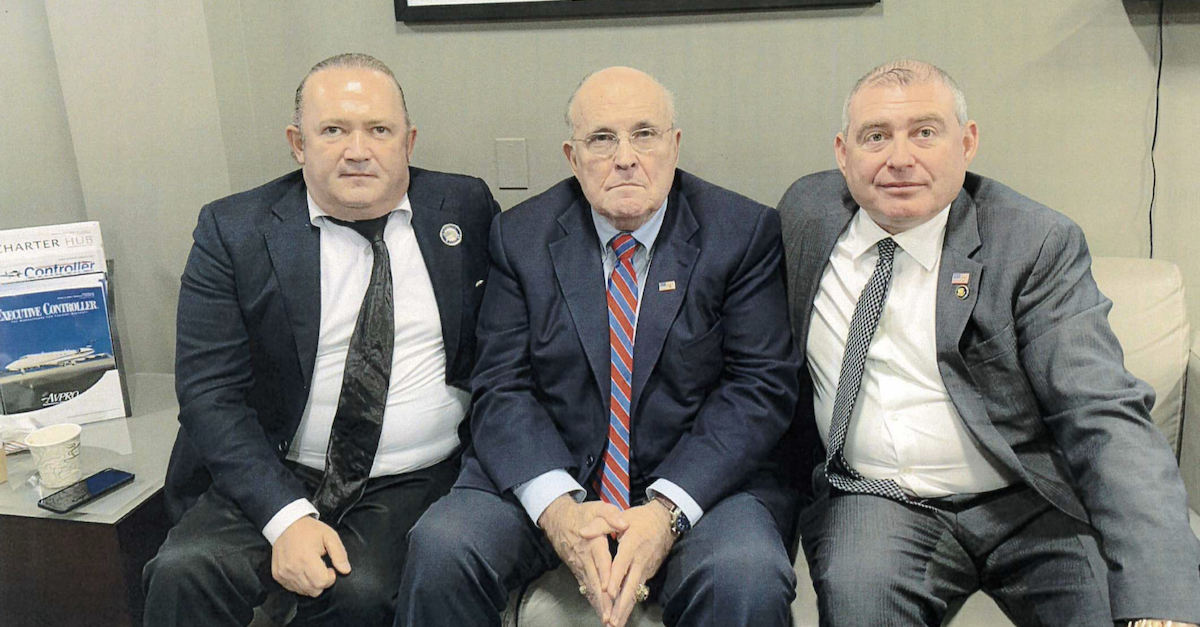
Lev Parnas disclosed this photo of himself and co-defendant Igor Fruman sitting beside Rudy Giuliani to the House Intelligence Committee before former President Trump’s first impeachment.
Shortly after a poorly redacted court filing by Rudy Giuliani’s former associate Lev Parnas revealed the more expansive reach of the government’s investigation, federal prosecutors opposed handing Parnas more of the evidence haul gleaned from warrants against the former New York City mayor, pro-Trump lawyer Victoria Toensing and others.
“Since the defendants’ arrest, the Government has produced hundreds of thousands of pages of discovery on a rolling basis,” Assistant U.S. Attorney Rebekah Donaleski wrote in an eight-page letter, arguing that no more court-mandated disclosure is needed.
“As part of those discovery productions, the defendants have received, among other things, copies of every search warrant and application relating to the indicted offenses; copies of every search warrant and application executed on the defendants’ accounts and devices, regardless of the offenses to which they relate; and the ‘responsive’ materials seized pursuant to those warrants,” the letter continues. “Each of the defendants has also received in individual discovery a complete copy of any account or device that belongs to them.”
Filed on Wednesday, the government’s letter hit the Southern District of New York’s docket one day after Parnas’s lawyer Joseph Bondy filed a letter to U.S. District Judge Paul Oetken—that may have revealed more than anticipated.
As first reported by CNN, the filing revealed—under botched redactions—that prosecutors also seized emails from an account believed to belong to Ukraine’s former prosecutor general Yuriy Lutsenko and an email and iCloud account associated with the ex-head of the Ukrainian Fiscal Service, Roman Nasirov. The government also obtained the iPhone and iPad of pro-Trump Ukrainian businessman Alexander Levin, earlier this year, according to information nestled underneath the black lines of Bondy’s letter.
The government’s response, though well-redacted, discloses 11 categories of search warrants, search warrant applications, and search warrant returns that prosecutors told counsel Parnas and his former business associate Igor Fruman related to their cases.
As disclosed in a redacted government brief, these are the search warrants and related applications that prosecutors believe pertain to the case against Rudy Giuliani’s associate Lev Parnas and others.
Prosecutors say that they almost have completed their “responsiveness” search for the first eight, and they note that the government’s application for a special master for information obtained from Giulaini and Toensing will delay their access to that data.
“None of the warrants authorize the search for or seizure of any evidence of the campaign finance offenses charged in the superseding indictment,” the government’s May 26 letter states. “Indeed, Andrey Kukushkin and ‘Foreign National-1’ are not named in any of the search warrants, and are only referenced in four of the search warrant affidavits in a description of the original Indictment.”
A Ukraine-born cannabis investor, Kukushkin is charged with Parnas in an alleged scheme to funnel foreign donations into the United States. Prosecutors say the unidentified “Foreign National-1” is Russian.
“While Fraud Guarantee is referenced in some of the affidavits, none of the warrants authorize the search for or seizure of evidence relating to Fraud Guarantee,” the letter continues.
This disclosure is significant because Parnas is separately charged with defrauding donors from that company, which paid Giuliani $500,000 for work associated with this ironically named business.
Prosecutors claim that the materials seized from Giuliani reveal little about the former mayor’s communications with Parnas.
“Based on a preliminary review, there appear to be few if any statements by Parnas in the Giuliani search warrant returns relevant to Fraud Guarantee,” they wrote in a footnote. “To the extent such statements exist and they are not duplicative of materials the Government has already produced to Parnas from his own accounts and devices, the Government will produce them in discovery.”
Bondy did not immediately respond to a request for comment.
Read the government’s letter below: